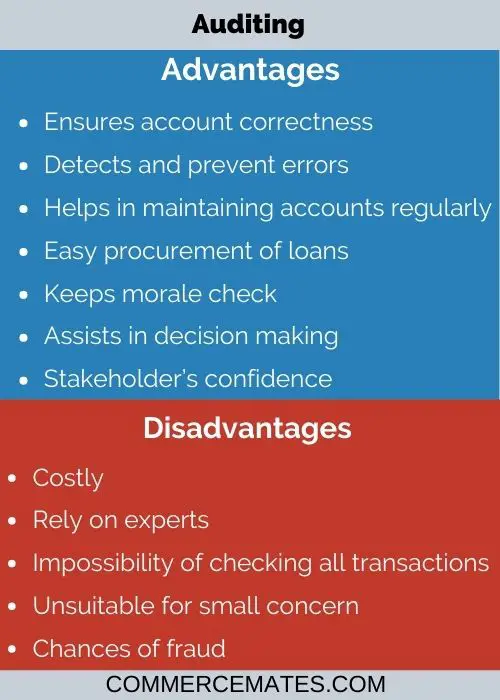Contents
Advantages of Auditing
- Ensures account correctness: Auditing conducts a detailed examination of all accounting books of an organization. It finds out the accuracy of financial records and ensures whether they fulfill all statutory requirements or not.
- Detects and prevent errors: It plays an efficient role in finding out errors and prevention of fraud. Auditing evaluates each financial transaction of business for checking if there is any mistake or not. This way it reduces the chances of errors and overall risk occurring due to such errors or frauds.
- Helps in maintaining accounts regularly: Maintenance of all accounts on a regular basis is another major advantage provided by the auditing process. It keeps a check on the regularity of account and raises questions if they are not maintained in an adequate manner.
- Easy procurement of loans: Auditing reports serves as a tool for easily acquiring the required funds from various financial institutions. These reports depict the true financial position of organizations to investors which helps them in deciding the credibility of concerned business organizations.
- Keeps morale check: Auditing monitors the overall financial dealing of organizations. This prevents the working staff from committing any error and fraud. All employees work efficiently towards their role with a fear that all irregularities will be identified by auditing.
- Assists in decision making: It provides valuable information to managers for efficient decision making. Auditing is done by various experts of account and finance who have detailed knowledge of subjects, so they provide advice and resolves all problems.
- Stakeholder’s confidence: Auditing statements enables in gaining the confidence of stakeholders. All stakeholders such as creditors, shareholders, banks, investors, etc. have more confidence in audited financial accounts of the company.

Disadvantages of Auditing
Disadvantages of auditing are as follows:
- Costly: Auditing process puts a financial burden on organizations as it requires the huge cost to conduct an examination of all financial accounts. Business needs to pay large fees to auditing experts for their services.
- Rely on experts: Auditor is dependent on experts of various fields for conducting auditing process. For acquiring true information regarding the valuation of fixed assets and contingent liabilities, he needs to approach valuers, engineers and lawyers.
- Impossibility of checking all transactions: Another major drawback of auditing is that it is not always possible to check each financial transaction of organizations. Some organizations are too big and have a large number of transaction, where evaluating all of them become quite an impossible task.
- Unsuitable for small concern: Auditing may not be fruitful for small organizations where there are limited transactions. Their accounts can be evaluated without an audit program.
- Chances of fraud: Audit may lead to errors and frauds in a business. Audit staff may perform their task carelessly and present an inaccurate audit report. Also, there may be chances where staff auditing accounts may be harassed within the organization and may be forced to manipulate the figures.